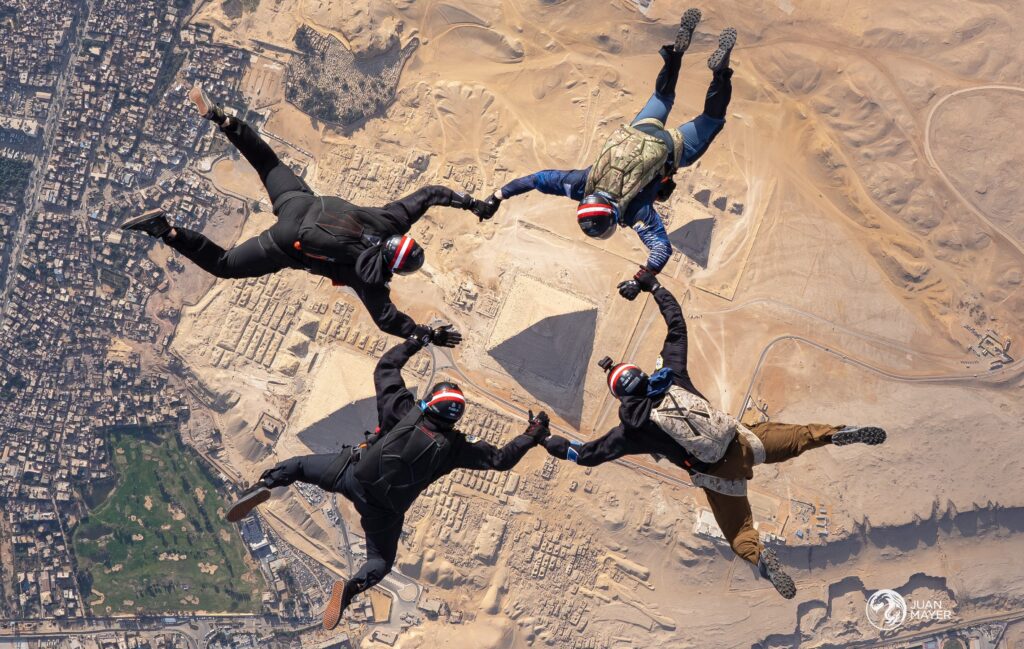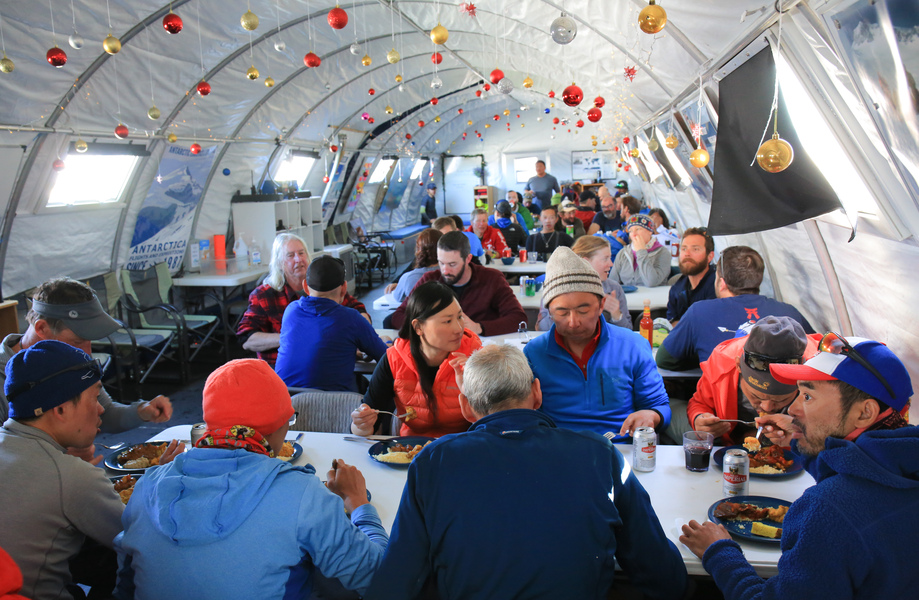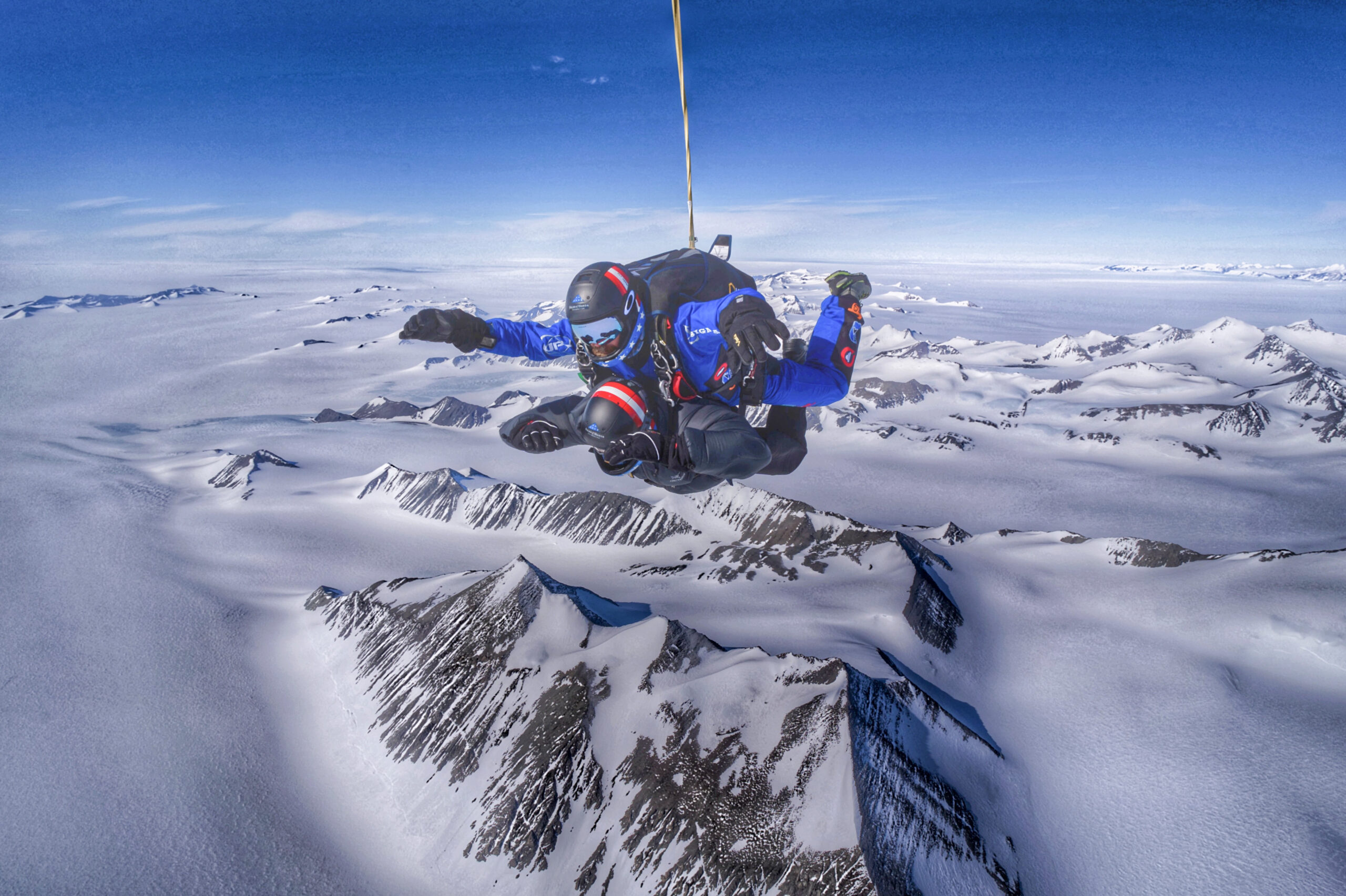What makes people jump out of an aircraft, and what makes them want to break a world record while doing it? We talked to Nick Kush, one of the brains behind the Triple 7 , an expedition planned to break world records by skydiving on seven continents in seven days.
It’s a sunny day in January at Antarctic Logistics & Expeditions’ (ALE) Union Glacier Camp and everybody is looking towards the sky. Fingers point at small white dots on the vast blue canvas. Nine war veterans have just launched themselves out of the Twin Otter and are now free falling towards the glacier at high speed.
The atmosphere on the ground is intense. Landing outside of the designated drop zone when skydiving is not advised in any place on the planet, but here in Antarctica, a miss can mean a dangerous encounter with a crevasse (a hole in the glacier). With nail-biting precision, the entire team lands safely on the ice and completes the first of their seven planned jumps.
JUMPING FOR A GREATER CAUSE
Kush is General Manager at Legacy Expeditions, an organization that dedicates each expedition they plan to the fallen Marines, soldiers, sailors, and airmen who gave their lives during the Global War on Terror.
Together with co-owners, Mike Sarraille and Andy Stumpf, the Legacy Expedition Team planned the Triple 7 to support Folds of Honor, a non-profit dedicated to raising funds for scholarships of children of fallen service members.
Kush was first introduced to Folds of Honor at a fundraising event. When he learned how the organization helped families, he knew he wanted to do more.
“We had a list of nine different nonprofits we were considering,” Kush said. “The main reason we chose Folds of Honor was their mission. They offer educational scholarships for dependents of 100% disabled or deceased service members, veterans and now first responders.” Kush was impressed by the full spectrum of families Folds of Honor helps compared to other organizations.
Ensuring scholarships to the children who have suffered loss is, for Legacy Expeditions, a way of shaping the future and make sure children get the best opportunities.
TRIPLE 7
So why seven jumps on seven continents in seven days?

The Triple 7 team jumping in Cairo, Egypt. Photo by Juan Mayer.
“Skydiving is a passion for all of us… we wanted something extreme that could attract attention to our cause,” Kush said. “We wanted to use the force of our tribal community to push the boundaries for skydiving.”
To make the dream become reality, Legacy Expeditions collected a unique team of veterans for the task.
“We would need people who could navigate the red zone: tired, hungry, and grumpy, and still perform, near flawlessly,” Kush said.
Reaching out to their network, Kush, Sarraille, and Stumpf, soon found six willing veterans who were up for an extreme challenge. Much preparation went into the project before they even left American soil: Gathering technical information, researching the diverse environment in the seven destinations, going through gear checks, and practicing precision landings.
The team quickly realized that Antarctica would pose a special challenge out of the seven continents. With the extreme cold, unpredictable weather, and isolated location, it was clear that the jump at Union Glacier Camp had to be approached with particular care.
“Proper gloves and gear were essential. It was -25F (-31.6C) when we jumped out of the aircraft at altitude,” Kush said.
The biggest worry was that the veterans would get stuck in Antarctica for several days, waiting for a good weather window, and consequently miss out on their goal. The solution was to start in the most unforgiving environment and then move across the globe to the other destinations.
THE VERTICAL EXPERIENCE
Kush’s first sight of the vast Antarctic desert was from the Boeing window next to his comrades. Like everybody else arriving in Union Glacier Camp, Nick landed on the B757 on the Blue Ice Runway.
Considering how few people gets to see the White Continent from above, the B757 flight experience already felt special to the Legacy Expedition Team. Realizing how even fewer people have explored the air free falling above the continent, was humbling for the jumpers.
“To see Antarctica from the air is unique, but to be in the air is something completely different,” Kush remembers. “It changes your perspective, not just of Antarctica, but the whole planet. It’s an extreme vertical experience”.
Out on excursions in the local area, the team was impressed by the beautiful glacier landscape, but what really blew Kush away was the human connection he experienced in Union Glacier Camp.
Sitting in the dining tent, the Fram, sharing a meal with people from all over the world was a unique experience.
“In Antarctica, the human connection started to dawn on me,” Kush said. “You meet climbers, expeditioners, photographers, and people with different goals. They all sit next to each other at the same table without discussing politics or looking into their phones. To see this, has restored my faith in humanity”.

Guests gather for a meal in the main dining tent, which is decorated for Christmas
Guests gather for a meal in the main dining tent at Union Glacier, which is decorated for Christmas. Photo by Alexey Nagaev.
At every skydive destination on their expedition, the team was met by incredible support and kindness. This compassion for the Triple 7 project was a crucial part of the expedition’s success when things turned difficult.
“When we landed in Miami and were on our way to the skydive location, we were told all aircrafts crossing the Atlantic were grounded,” Kush said.
A Notice to Air Missions (NOTAM) system failure could have put an end to the entire project, but by reaching out to their network and followers, the Legacy Expeditions crew managed to get funding and support to private charter an aircraft (the only non-commercial flight on the whole expedition) and make it in time to Barcelona without jeopardizing their jump in Cairo.
Despite less-than-ideal weather conditions in Barcelona, Kush and the team managed to spend a mere 5.5 hours in Europe, securing their fourth jump, before flying to Egypt for the fifth jump. With over 68 hours of flight transport across the globe in just under seven days, with lack of sleep, and exhaustion from their ground-breaking expedition, the Triple 7 team taxied down the runway for their seventh and final jump.
“We had high winds and I just kept thinking: they better let us jump,” Kush recalls. “As soon as I saw the plane door opening and people jumping, I knew we had done it. Free falling over Australia was a feeling of YES, we did it!”
Touching down with their parachutes in Perth, on the 15th of January 2023, was the culmination of years of hard work and training. Kush calls the moment “surreal.” The team celebrated their grand achievement with a beer, packing up their gear, and getting well-earned sleep before heading back home to the US.
THE MISSION CONTINUES
The Triple 7 holds four new world records and continues to raise funds for 1,400 scholarships; however, the work doesn’t stop there.
Skydiving, Antarctica, and Folds of Honor converge once again in the upcoming 2023 Antarctic season. ALE is proud to donate proceeds from a set of our one-of-a-kind skydiving jumps over Antarctica to continue to support the families of America’s fallen or disabled military and first responders.
“I’m very grateful to feel like an ambassador not only for Folds of Honor, but also for the growth and knowledge of what goes on in Antarctica,” said Kush. He never imagined these two worlds overlapping but now feels incredibly proud to aid in increasing awareness of both.
Read more about ALE’s unique Antarctic skydiving experience here, and about the families Folds of Honor has helped here.





